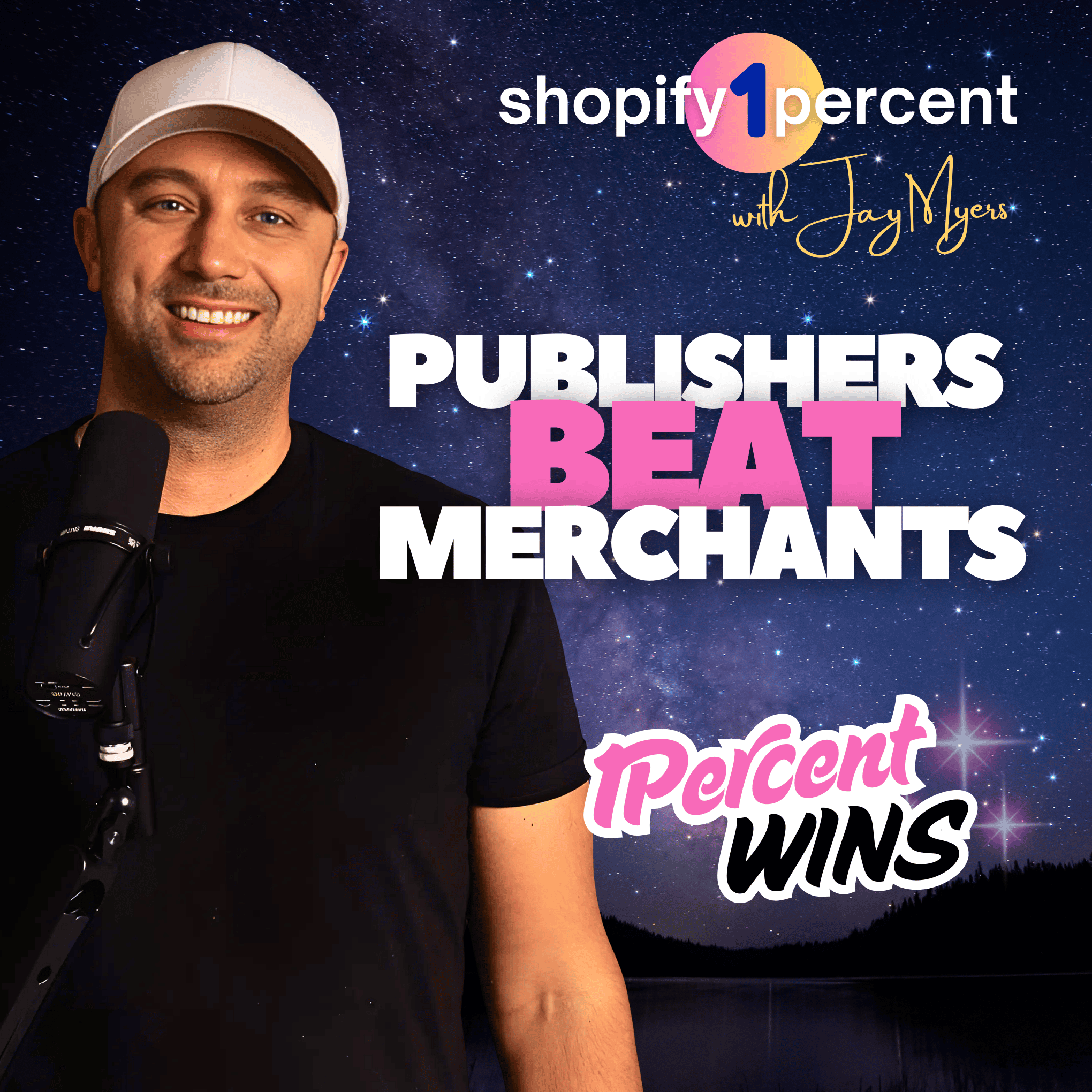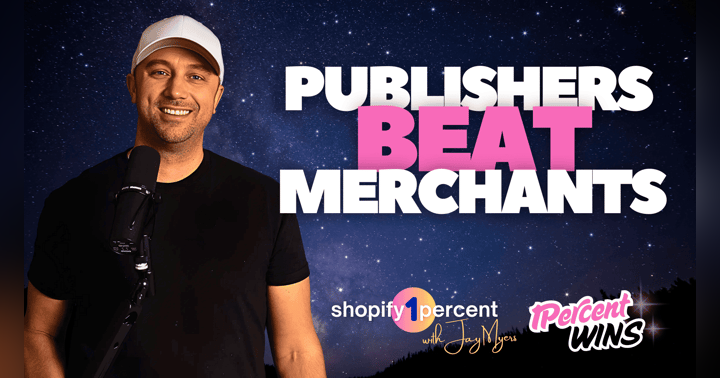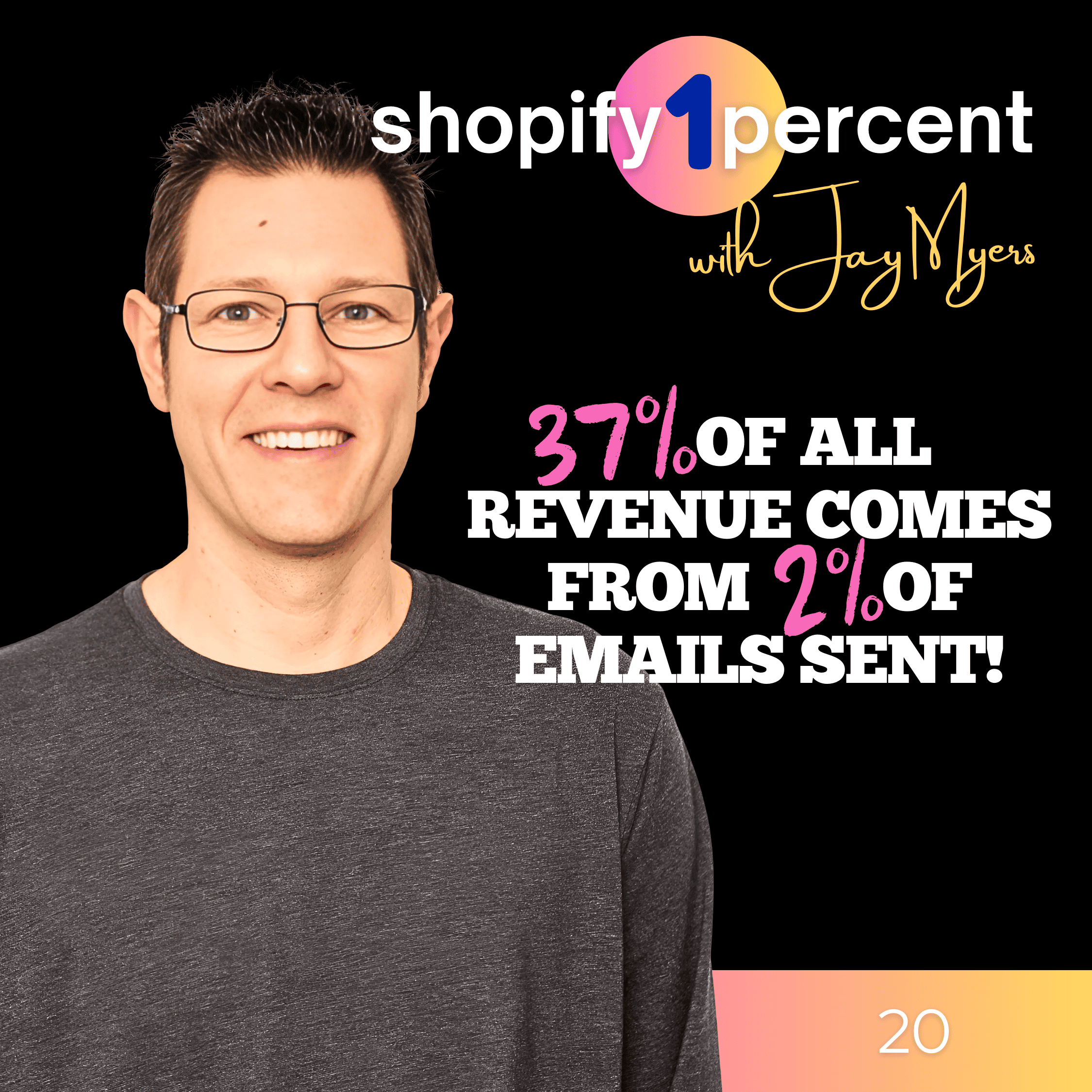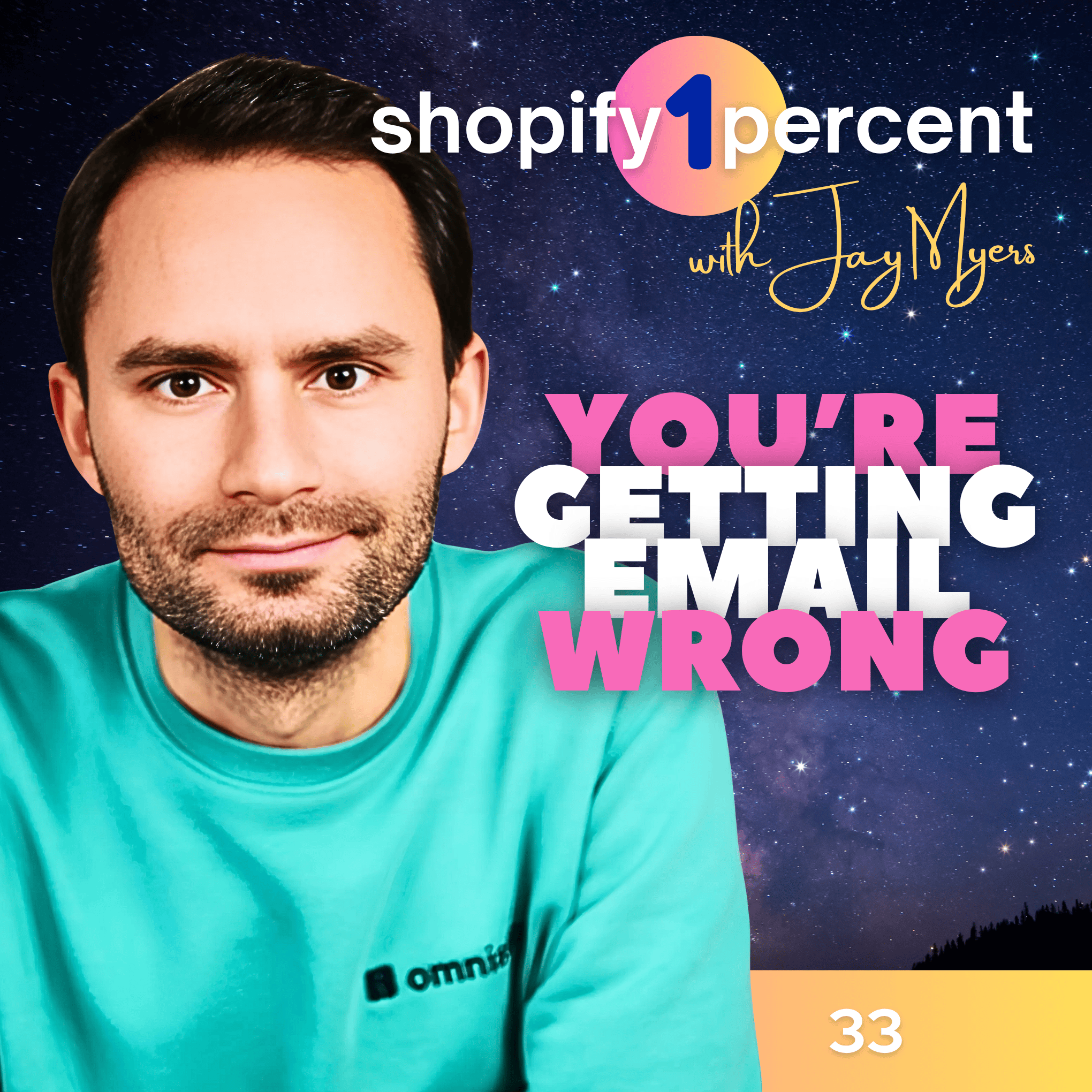🏆 SHOPIFY 1% WINS: Shopify Growth Hack: Think Like a Publisher, Sell Like a Pro

Imagine telling your team, "We're not a product company anymore. We’re basically Netflix with a checkout button." Sounds ridiculous, right? But here’s the kicker. It’s true. In this episode of the Shopify 1% Podcast, I break down why the future of your Shopify store has less to do with selling products and more to do with publishing content. Here’s a stat to make you sweat: 47 percent of online buyers read at least five pieces of content before buying. If your brand isn’t creating that content, someone else is doing it for you, and probably stealing the sale while they’re at it. This episode is your 1 percent win for shifting your mindset from "product pusher" to "publishing powerhouse."
Imagine telling your team, "We're not a product company anymore. We’re basically Netflix with a checkout button." Sounds ridiculous, right? But here’s the kicker. It’s true. In this episode of the Shopify 1% Podcast, I break down why the future of your Shopify store has less to do with selling products and more to do with publishing content. Here’s a stat to make you sweat: 47 percent of online buyers read at least five pieces of content before buying. If your brand isn’t creating that content, someone else is doing it for you, and probably stealing the sale while they’re at it. This episode is your 1 percent win for shifting your mindset from "product pusher" to "publishing powerhouse."
Key Take-aways
- The top Shopify brands act like media companies that happen to sell products.
- Nearly half of shoppers consume five pieces of content before they make a purchase.
- Blogging is still a killer strategy for SEO and long-term growth but is criminally underused.
- Use customer questions as blog fuel. ChatGPT can help you get started, but always personalize it.
- Social media, newsletters, podcasts, and PR are all part of your publishing toolbox.
- Sharing founder stories and behind-the-scenes content builds stronger customer connections.
- Getting press isn’t just for big brands. One good article can change your brand’s trajectory.
- Pick one content platform and commit to 30 days of consistent publishing.
- Pitch yourself to podcasts in your niche. It is easier than you think and builds serious authority.
Stop saying, “I don’t have time.” Say, “I’m not prioritizing that right now.” It changes everything.
🫶 Please support the amazing sponsors that make this show possible 🫶
Omnisend - I personally use Omnisend for every Shopify store I manage! I’ve tried them all and Omnisend is hands down the easiest way to set up email and sms automations and campaigns, leverage segmentation to personalize them, and A/B test everything to optimize conversion. The push notifications and gamified email collection tools are just the icing on the cake 🤌
(plus most report paying about half the price of Klaviyo 🤫)
🚨Listeners (YOU) get an exclusive 30% OFF for 3 MONTHS: https://shopify1percent.com/omnisend
Bold Commerce - Maximize your Shopify sales with Bold's suite of powerful apps. From AI Upselling, to powerful Subscriptions, Memberships, and VIP Pricing tools, Bold has everything you need to Maximize your Shopify revenue!
Try Bold apps for free here: shopify1percent.com/bold
Did you know leaving a ⭐️⭐️⭐️⭐️⭐️ review on Spotify, or Apple will give your shop gooood ecommerce karma? ❤️
So the other day I was driving with my wife and she asked me, Hey, what'd you talk about with your one percenters today? And I thought, huh, what a great way to refer to people in our community. The show is the 1% Shopify 1% podcast. We're all focused on helping brands increase, make changes that make a 1% impact.
And so I just loved this concept of the one percenters. So. If it's okay with you, I'm gonna start referring to you as my one percenters. I love it. I absolutely love it. I think you know, how we see ourselves and the labels we give ourself make a huge impact in life. And you know, if you, if you call yourself a loser or something else, I think that makes an impact.
And I think if you call yourself some kind of like an achiever, your inner voice, I, I think it makes a huge impact too. And so I love one percenter. I'm a one percenter. I, you're a one percenter if you're listening [00:01:00] to this. You're a one percenter. You're focused on making 1% impacts to grow your Shopify business.
So I'm actually gonna get t-shirts made, one percenters, and I'm gonna send them every single person that leaves a five star review for this podcast with a comment. Is gonna get a one percenter t-shirt. So if you leave a review, let me know. Email me jay @ Shopify 1percent, so that's Shopify the number one and then percent spelled out Shopify 1 percent.com jay@shopify1percent.com.
I don't mind giving everyone my email. Email me and let me know and I will send you a one percenter t-shirt. I just love the concept so. Welcome one percenters on the thread of 1%. Uh, I've been kind of referring to these as daily shorts. We're changing this. Th this is, these are gonna be 1% wins.
So each day I'm gonna share a 1% win. Let's just cut right to the chase. These are meaningful bits of advice that can make at least a [00:02:00] 1%. Impact in your business and when you improve 1% every day for a year, you at the end of the year have improved 3700%. So today's 1% win is, here's a thought for you.
You're not a store, you are a media company and it's what you're actually selling is not products you're selling. Attention, and I think this needs to be a big mind mindset shift for a lot of brands, is they think they're selling their products. They're talking about their products, they're promoting, they're advertising their products.
Product product, sale, discount, promotion. Everything's about the product. But you're actually not a product company. You're a publishing company that sells products. And if you look at the best brands out there, they are all publishers. They are on. Now we're gonna get into a little bit of what does it mean to be a publisher, but [00:03:00] they are putting content out into the world and they have an amazing product.
Now you need to be selling your products, but you need to be a publishing company first. I, I'm gonna say it first. You need to be a publishing company first, then a product company. There's, the world has enough. Product companies out there. I mean, Amazon has a version of every single product. They're a product company.
People just go straight there to find a product. If you wanna win, you need to be a publishing company. And actually, there's a lot of data around this too. And so, actually, I did a little bit of research before this. 40, 47% of people that buy a product online, consume or view five pieces of content before making a purchase.
I mean, so it's part of the journey. They don't just. Go to your store and buy Amazon might be a little bit different. And actually I would argue that Amazon it might be similar too because they still view the content, but they end up clicking an affiliate link. Uh, you know, top 10 camping stoves.
Those are publishing. It's just not Amazon doing the publishing, [00:04:00] it's the affiliates or it's the brands who are selling on Amazon. So, you. Content is so important for so many reasons. It, it's good for SEO, it's good for building relationship. It helps you rank it's evergreen content and it's just it, and it has compounding returns, right?
So when you put content out into the world, it's not just one and done. Uh, that content can bring you returns for a long, long time. So. What does this look like? What does this mean to be a publisher? If you, if you believe what I'm saying and you say, okay, I want to be a publisher first. It's actually not as hard as you think.
There's a lot of ways you can go about this. Some of one is blog content. I actually think blogs are one of the more under underutilized tools right now for content. You know, we, we went through that. Craze, I guess, I don't know, maybe craze, but like in the early two thousands where everyone had a blog and now everyone has like a social profile and there's different ways you have your [00:05:00] audience.
But do you remember when everyone had a blog and there was, and the comments on the blogs were super active? It's not that way anyway anymore for sure, but blogs are. Very easy to produce and great for SEO and great for keeping your site updated. Google cares about how recently updated your, your site is.
Um, and blogs can be really easy to, to create. They are, you can just take, actually, I have a, I'm gonna talk about this in a little second, but I'll just mention it now. One of the things I love is take one customer question every week and then turn it into a blog post. So some question that a customer emailed you about or, or was asked on social media, turn that question into a full fledged blog post.
Make sure it's SEO optimized for your product or your niche. And there, and boom, you got a blog post and you can, you can use chat GPT for this. Like take, you can take a support ticket that a customer asks with your answer. Put it into chat, GPT, ask it to create a, a. A 300 to 500 word blog post with.[00:06:00]
Key points and break out the steps keyword optimized for your topic, and boom, you've got a blog post. Now, I, I would not just copy and paste it. I would use that as a starting point and then go in and, and modify it and edit it a bit and make it, you know, you, you can get good at this. Definitely don't copy and paste it.
Modify it first, but use it as a starting point. Okay. Blog content, social media. Social media is a great way to entertain, inspire, educate your customers, and just really engage with them. Emails and newsletters. Another way to, to publish. You own the channel when you have emails and newsletters.
Podcasts are great. Po and guest appearances on podcasts. You don't have to host a podcast. You can get on podcasts. It's easier than you think. We're, we'll talk a little bit about it. PR press coverage. I think this is another huge underutilized area. We think that press releases are only for big companies, but if you have something to say, if you are.
Have an opinion on something in your space, like if the [00:07:00] product you built is solving a new problem, or if you're approaching in a certain way. Selling in a certain way. If you're doing a neat thing, like maybe you, you, you sell shoes, but for every pair of shoes bought you, you donate a kid a pair of shoes to a kid at school.
Like if there's something you have to talk about, leverage PR firms, and there are ones out there that actually don't cost a lot. I know sometimes there's ones that can be very expensive. There's a couple that I, I know that are relatively inexpensive and I'll put a couple links in the show notes, but.
It's AMA one, one, good press coverage. The impact that can make to your brand is huge. Now, people may or may not read all of them, but you get to use the logo on your site. You get to add it to your, your title, your LinkedIn, like if you get one Forbes article or one Glossier article or something that is in your niche, you can now forever say.
Like, you can have that in your title, you can have the logo on your website, and it's huge. Another type of [00:08:00] publishing is founder stories behind the scenes content. You know, like a lot of a brand that does this really well is midday squares. They're, they are, oh man. I was talking to one of the founders and they said they have.
It was something like 20 terabytes of video footage. They literally just film everything every day in the factory making the bars in their offices. They film everything and then they turn, they have a, a team that just turns it into content for social media. It's like all behind the scenes type material.
And it's done fantastic for them. They've blown up and they're in Costco and Target and they're everywhere. But they were a publishing company, not. A energy bar company, they're a publishing company. It's so important to understand what people will always say. Like, well, how did they beat all these other, you know, midday, I, I shouldn't say energy bar.
They wouldn't want it called that. They're like, it's not like an energy bar. They're a health health anyways. I'm not, I'm not on their marketing team, but you get the point. But [00:09:00] they're not competing against like the. The material that it's made out of and the features and all that. They're a publishing company.
They're building an audience. Okay. So, why do most brands not do this? If we know that it's important to do and we Okay. Yeah. I look at all the top brands, like they, yes, they were, they're publishing companies first. Why are they not doing it? Well, we all say I don't have time. I don't know what to say.
I'm not good on camera. Well, you know what? Neither were any of these companies ne, none of them had time either. None of them were good on camera and none of them probably knew what to say when they started. So, and in fact, I would say being really good on camera is actually not important at all.
I think authenticity is what matters. And I would not worry at all about how good of quality equipment you have. I think just be authentic. Be you make time for it. There is no such thing as not finding time. It's, you can say, I'm not [00:10:00] prioritizing that now, but if you ever find those words, this is a little side note, if you ever find the words saying, oh, I don't have the time, stop saying that because that is an, that is not an empowering way of, of talking, say, I'm not prioritizing that right now.
And that's the truth. And I think we need to, you know, we speak truth about how we are making decisions and it's, it's stressful and you can feel like even when I, when I say to myself, oh, I don't have the time, and where can I find the time? I start to feel this like tightness in my chest. And that's because that's not an empowering way of looking at the world.
That's like saying I have no control. The world is in control. It moves the power into outside. Forces versus inside, versus if I say, I'm not prioritizing that right now, I could do it. I'm just, I'm not prioritizing it. So anyway, just a little side note, if you ever find yourself saying, I don't have the time, change your language to, I'm not prioritizing that right now.
And you'll see how you look at things differently. And it's true, [00:11:00] you're not prioritizing it right now. So you have the time, you're just, you're not prioritizing it right now, so, okay. Let's, uh, let's get into a few things that you can do. I would say if you're bought into this, choose one pat platform that you can commit to for 30 days to put content into.
That can be Instagram reels, LinkedIn, TikTok, blog post. Just show up every day for 30 days or some cadence. Don't. Don't just post when you say, I'm going to commit to this for the every 30 days and post when I feel like it. No. Say I'm gonna do it every second day, or I'm gonna do three a week, Monday, Wednesday, Friday, uh, and stick to that.
I, I honestly would try to do more, but it's important to be consistent. For at least 30 days and one platform. Don't try to do them all. Don't try to create content and then put it on every platform. Just pick one. Just pick, pick one and go in on it for 30 days. Simple. Okay. If you're not sure what to do, I honestly would do the founder's, the founder's [00:12:00] story or the founder's journal founder's.
Um. Just talk about what you're working on. Talk about your challenges. Talk about your company, your team, your why, your vision, your mission, your product, why you started it. Just why you build it, why you love this company, why you, why you care about it. Like just everything. Like talk about your story and break it into pieces each day.
There's definitely lots more you can talk about, but. I'm just saying if you don't know what to talk about, if you're like, great, I wanna do this every day for 30 days, I don't know what to talk about. Just start with your founders. Like a found, call it a founder's journal. One other thing I would probably do is I would, in the next 30 days, set a goal to pitch yourself to three podcasts.
Re find podcasts in your niche. Make sure you listen to a number of their episodes, which you probably do already and you should be doing. Um, make sure you understand the format and style. Reach out to the host. Most hosts are very receptive and often they're looking for guests and explain that you love [00:13:00] their show.
You've been listening to it for a while. Which episode is your favorite one? You love the episode with John from this company. Um. It's expressed that I think I would have a lot to offer as a guest on the show. Uh, I've taken a unique approach to X marketing strategy, or I've done this on my website, or I've figured out a really great way to grow my audience through this channel.
But give, give something. 'cause like, remember these podcast hosts, they want to give their audience valuable insights. So you don't just say, I love your show. I've been I've been a listener and I would, I'd love to be a guest. That'll just get deleted. Trust me, I get a dozen of those emails every, I don't know, every, and not quite a dozen a day.
I'm, I'm getting about six a day. And there's a lot of people looking to get on podcasts, so you, it doesn't take much to cut through it a little bit. If you really want to take a step up, you could create a one pager PDF with your headshot, uh, short bio your accomplishments your brand, your a, [00:14:00] your story, what you're passionate about, a few key things that you wanna.
Dive into on the show and, you know, some recent, uh, media that you've been mentioned in. It's like other, other podcasts you've been on, news articles, YouTube videos, webinars, anything like that. I love that when I get those from potential guests, they're like, here's everything. Here's what I wanna talk about.
Here's other appearances I've been on that. We'll put you in the top 1% of, uh, of people asking to be on a podcast. So reach out to three just to make that your goal. Reach out to three podcasts, uh, with a little bit of a strategy getting on. Uh, that's a that's publishing, right? And then on your, on, on the blog, I, and I mentioned this earlier, but I had a note here to mention again.
So I'll just say like, there's a lot you can blog about, but I do think one of the best things is what customers are asking and. Not only because it's interesting to customers, like if a customer support tech is about a certain thing, it's also probably [00:15:00] inherently very SEO friendly, like a question.
People go to Google with questions. So I dunno, let's just say you sell a camping stove and if someone asks the camping, the asks you in an email, what is the best way to start this camping stove in the fire, in the rain? Or is this. Camping stove safe. If there is a fire ban on. Actually right now that's happening where I live, there's been some wildfires, so we can't have a fire when we're camping.
And so there's some camping stoves that are maybe considered safe and some that aren't, and some of them have anyways. So like that's a question I would go to Google with. And now if you have a blog post that is. All about that question. It will rank first. So easy to do, so it's so, so easy. So that's just a great idea if you wanna turn some of the, or if you're looking for content for your blog.
So, okay. I could go on about this. I know I went a little bit longer than I wanted to, but I think [00:16:00] this is a really important one. If you make that mindset shift that you're not a product company, you're a publishing company. I promise you this will be much more than a 1% win. So, uh, and, and it's true today that the best brands are publishing companies, but it's gonna be even more true tomorrow, especially with potentially AI becoming a big way that people buy, like people are going to ai, they're asking it for.
Recommendations on sunglasses to wear and certain things like your website and how good it looks and all that is be, will probably become less important. And how you engage with the world through your publishing channels will be even more critical. And so it's important now, but it's gonna be even more important in the next few years to come.
So, you know, the product gets you the transaction. You, you have the product for that. But your [00:17:00] content, your publishing strategy, it gets you the relationship and there's no purchase without that. So that's my challenge for you today. You are a publishing company, not a product company. I'm not gonna make you say it with me, but say it in your head.
Okay? And believe it. And now go out. Pick a couple of those strategies we talked about. And there is your 1% win for today. Thanks for listening and I'll see you on the next episode. These have been so much fun and just real quick, if um, if you got your phone in your hand or on your computer, hit subscribe and I would love it if you left a five star review.
We are really trying to get as many as we can, and if you leave a comment with it, we featured on our website and email me, like I said at the beginning of the show, JAY jay@shopify1percent.com. Email me, let me know and I will send you one of our new one percenter t-shirts. Or hats. We're probably gonna have a few different things.
So thanks so much everyone. See you next week.

























